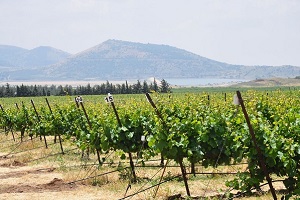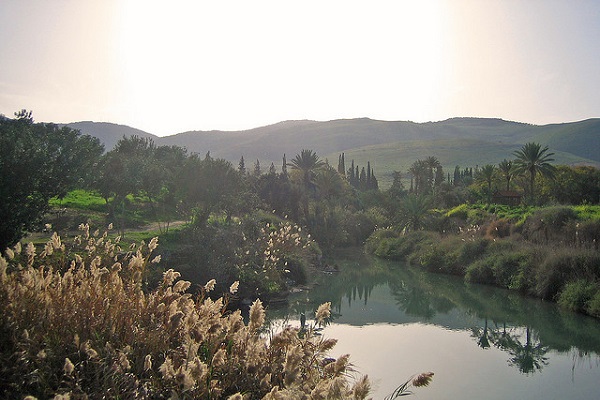A Tree In Israel Speaks
By Yaffa Klugerman
"Even if every wind in the world were to come and blow upon it, they could not shift [a tree] from its place."
- Pirkei Avot 3:22
I dare you to walk by me without stopping. Go ahead, try it. I'm certain you'll fail. Few among you can resist the lure of my majestic presence beckoning you to lounge in the shade by my side.
What causes such confidence? History, my friends - the history of this place.
For centuries, pilgrims have walked along the path from Tzfat to where I was planted in the 15th century, a solitary guard at the graves of Rabbi Abba Halafta--a second-century Talmudic sage--and his beloved sons Yossi and Shimon. If you could step back in time, you'd witness much the same scene as the one that lies before you now.
Aside from a modern wall built around the sages' tombs, the winds of change seldom blow this way.
I remember when Rabbi Moses Basola, an Italian religious leader, visited in 1523. "The place is lush and fertile and full of everything good," he wrote to friends back home. "There is also a spring with good water. I prayed there over the grave of Rabbi Halafta, which is on the plain, and a large oak tree is over it." That's me.
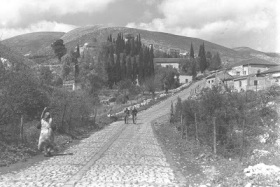
Copyright © israelsdocuments.blogspot
Back then fewer trees bloomed in the land, and people considered me a special landmark.
When Jews reclaimed and reforested Israel in the early 20th century, I lost some of my distinctiveness. In fact, most people who see me don't realize that I'm the oldest Mount Tabor oak tree in the Land of Israel.
But that's fine; I'm happy to guard the graves of these righteous Jews, nod my leaves at passersby, and provide them with a place to rest.
Tzfat and I grew together, each of us sending roots deep into the land. When scores of Jews fled here from Spain in 1492, many pious Jews made Tzfat their home.
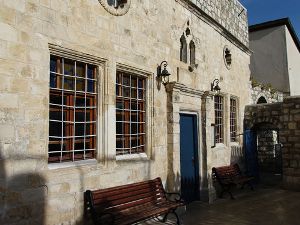
I fondly remember Rabbi Yosef Karo, the author of the Shulhan Arukh, the Code of Jewish Law, and Rabbi Solomon Alkabetz, composer of Lekhah Dodi. Rabbi Yitzchak Luria - known as the Ari - who compiled the Kabbalat Shabbat prayer service in the 16th century, stood taller than most. I'll never forget those Friday evenings when he led his students into the fields to welcome Shabbat. The dry mountain air in the Galil carried their spirited prayers to me.
Today, Jews still pray in the Ari's synagogue, which stands on the exact spot where he and his students once sang; I know, because I hear their voices and the voices of other local communities who welcome Shabbat the same way.
Nowadays, most people pray indoors, and some of the melodies have changed. But the Ari planted those beautiful Shabbat prayers deep in the hearts of Jews everywhere, and these same words to God's glory have nourished Jewish lives for centuries, like my own extensive roots have helped nourish me - here in the Land of Israel.
I survived hard times too: an epidemic decimated the community in 1747, and the earthquake of 1759 destroyed Tzfat and killed 2,000 people. After those tragedies, I worried that the area would never recover, but the Jews rebuilt Tzfat, and continued to live there. Every minor rumble after that scared me, but in 1837, my branches shook violently again as another earthquake claimed the lives of 5,000 people. I saw many people pass by as they left the demolished town to build homes elsewhere.
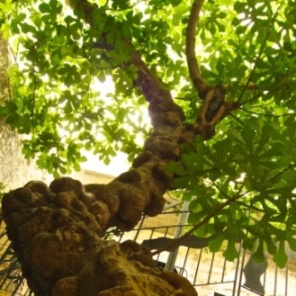
Photo By: Fourlinemedia
Yet, in the same way that I remained steadfast, Jewish ties to the land endured. I heard the rumble of explosions in May 1948, when 200 Jews bravely defended Tzfat against thousands of Arab troops. It then officially became a Jewish town, though I know better than anyone that it has always been so.
So much has occurred in my 600 years of life, but I often marvel at how much remains the same. Perhaps people dress differently, ride cars instead of horses, and travel a road to Tzfat instead of a path.
Yet the sun continues to rise and set, seasons come and go, and everyone still appreciates the simple pleasure of sitting in my shade.


